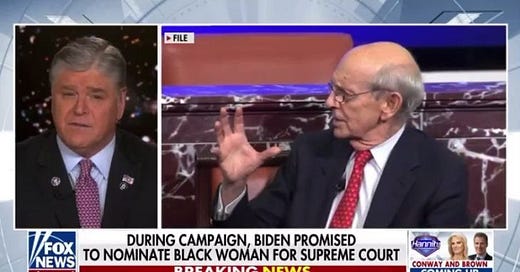
Today’s big news is that Supreme Court Justice Stephen Breyer plans to announce this week that he will step down from the court at the end of the term. He is expected to make the announcement tomorrow at an appearance with President Joe Biden. Breyer is 83 years old; he took his seat on the court on August 3, 1994.
While the recent extremes to which Senate Republicans have gone to dominate the Supreme Court have made the seats seem simply to reflect political parties, in fact Breyer’s history on the court shows how American democracy and, with it, the Supreme Court, have become partisan since the 1980s.
Breyer has always been adamant that the court must not be political. Instead, he has advanced a strong defense of democracy, arguing that the main achievement of the Constitution was to set up a system that would accommodate the changing needs of the American people. To that end, he is a scholar of administrative law, examining the detailed ways in which our system works.
Democratic President Bill Clinton appointed Breyer to a seat formerly held by Harry Blackmun, who had been appointed by Republican President Richard Nixon. Blackmun was a justice in the days when it made sense for a Republican to support measures that defended civil rights: he was the author of the 1973 Roe v. Wade decision protecting a woman’s right to choose an abortion. So the seat, itself, has been characterized by pragmatism and moderation, rather than political affiliation, since the 1960s.
Clinton appointed Breyer to the court after President Ronald Reagan had set out to change the Supreme Court to reorder the nature of the country. From 1954 until 1987, the prevailing principle of the court was that it must protect civil rights, especially when state legislatures discriminated against certain populations. Using the Fourteenth Amendment’s declaration that all Americans should enjoy equal protection under the law and receive due process of the law before losing any rights, the Supreme Court stepped in to try to make sure that all Americans were treated equally before the law.
Americans who resented the court’s protection of equal rights insisted that the justices protecting civil rights were “legislating from the bench,” or were exercising “judicial activism” by changing laws that the people’s elected representatives had enacted. They insisted that the court must return to enforcing the letter of the law, simply interpreting what the Framers had written in the Constitution, as they had written it. That view of the Constitution would erase the expansion of civil rights—desegregation, interracial marriage, access to birth control, and so on—that the post–World War II Supreme Court had enshrined into law. Those who embraced this literal version of the Constitution called themselves “originalists” or “textualists,” and their intellectual representative was Justice Antonin Scalia, appointed to the Supreme Court in 1986 by Republican President Ronald Reagan.
Breyer is an intellectual counterpoint to Scalia. In a book Breyer wrote in 2005, he took on originalism with his own interpretation of the Constitution called “Active Liberty.” Breyer explained that we should approach constitutional questions by starting at the beginning: what did the Framers intend for the Constitution to do? Their central goal was not simply to protect liberties like free speech or gun ownership, he argued; their goal was to promote democracy. All court decisions, he said, should take into consideration what conclusion would best promote democracy.
The conviction that the point of the Constitution was to promote democracy meant that Breyer thought that the law should change based on what voters wanted, so long as the majority did not abuse the minority. Every decision was complicated, he told an audience in 2005—if the outcome were obvious, the Supreme Court wouldn’t take the case. But at the end of the day, justices should throw their weight behind whichever decision was more likely to promote democracy.
That idea honored the changing necessities of the modern world and thus stood against the originalists. Although that vision was not always aligned with the Democratic Party, it was firmly rooted in the idea that the point of the Constitution was to anchor a nation in the voice of its people.
Now, of course, thanks to the three justices former president Donald Trump added to the Supreme Court, originalists have a strong majority of six of the nine seats on the court. Biden will undoubtedly try to counter those originalists with a justice who embraces a vision more like Breyer’s, but it would be a mistake to see this as a question of partisanship so much as a question of what, exactly, the American government should look like.
Should the federal government be able to protect equality before the law, or should state legislatures be able to do as they wish? In the last year, the right-wing majority on the Court has allowed the state of Texas to undermine the constitutional rights of women, established by Blackmun’s decision in Roe v. Wade, and has indicated it will challenge the ability of Congress to delegate power to regulatory agencies in the executive branch, thus hamstringing the modern government.
Breyer’s successor will, almost certainly, stand against such “originalism.”
Already, Republican voices are opposing the idea of Biden appointing a Supreme Court justice. During his campaign, Biden vowed he would appoint a Black woman to a position on the Supreme Court, and today White House press secretary Jen Psaki said he would keep that promise. There are a number of truly exceptional candidates for the post. Nonetheless, Fox News Channel personality Sean Hannity tonight called Biden’s promise “unconstitutional discrimination.”
And yet, University of Texas law professor Stephen Vladeck noted that representation on the Supreme Court has been wildly skewed. Of the 115 Supreme Court justices we have had in our history, we have had 108 white men, 2 Black men, and 5 women (4 white; 1 Latina).
Breyer has pointed out that there is almost always a tension in our laws. In this case, should we adhere to the ideal that the law should be race and gender blind, or should we work to remedy past wrongs? This seems an excellent example of where the principles of “Active Liberty” are useful: addressing the obvious skewing of representation on the Supreme Court seems like a good way to promote democracy.
There is other legal news today, as well.
In matters close to Representative Matt Gaetz (R-FL), we learned that Florida shock jock Joe Ellicott has been cooperating with federal prosecutors. Ellicott is friends with Joel Greenberg, the Florida tax official who was friends with Gaetz and who has pleaded guilty to fraud and to sex trafficking of a minor. Greenberg has also been talking to prosecutors, and so has Gaetz’s ex-girlfriend. Tonight the Daily Beast reported that Ellicott could confirm that Greenberg told Gaetz that they had sex with a minor (Gaetz has denied any such knowledge).
Former assistant U.S. attorney for the Southern District of New York Richard Signorelli tweeted that the apparent delay in charging Gaetz in the sex-trafficking case may come from the fact that Greenberg was such a problematic witness that the Department of Justice wanted everything corroborated. The news that both Ellicott and Gaetz’s girlfriend have testified might relieve that concern.
—
Notes:

https://www.brookings.edu/wp-content/uploads/2012/04/20051017Breyer.pdf
https://www.npr.org/templates/story/story.php?storyId=4929668
https://www.thedailybeast.com/florida-shock-jock-joe-ellicott-in-matt-gaetz-circle-pleads-guilty
https://www.cnn.com/politics/live-news/scotus-stephen-breyer-retirement/index.html










'Originalism' pretends that the intent of the Framers can be divined and 'textualism' pretends that dictionaries are the last word on meanings. They are both lies, fabricated whole cloth to roll back progress on civil rights and government taxation to pay for social services. Lies in service racist populists and rapacious plutocrats.
There is no *letter of the law* there is only textual interpretation. And in every other field of textual interpretation, from Torah based Judaism to literary criticism, the always dubious notion of 'author's intent' was debunked long ago.
As Rabbi Hillel said, in the last days before the christian era, "That which is hateful to you, do not do to your fellow. That is the whole Torah; the rest is interpretation; go and study." Hillel also said "If I am not for myself, who will be for me? And being only for myself, what am I? And if not now, when?" This is an early expression of the ethic of reciprocity, the so called Golden Rule which the Founders translated into civic law by prioritizing the general welfare of the people.
As Jacques Derrida demonstrated, the meanings of words are not self sufficient units, they exist within a textual and linguistic context. In a social context. Words 'mean' in relation. Dictionaries do not fix words for all time, they trace the trajectory of meaning over social space. Please note, Derrida spent his life in social and political activism, including working on behalf of Nelson Mandela and in developing the South African archive to serve truth and reconciliation (which preceded similar American formulation of critical race theory.)
It is that Republicans prefer to interpret the Constitution to perpetuate the Founders' 'original sin' of legitimizing racism against Black people in the form of enslavement, now in the form of economic injustice. To do this, GOP Leader Mitch McConnell effectively opted out of the Constitution to pack the courts. Since Reagan, Republican racist right wing religious extremists, ably served by Federalist Society dark money kingpin and kingmaker Leonard Leo, kept their eye on the Supreme Court.
In 2016, left wing voters took their eyes off the prize, preferring to indulge in purity tests, pipe dreams, and pied pipers. In 2022 many are still at it - misinterpreting voting as a personal gesture in service of self expression, rather than a political strategy in service of social responsibility.
Originalism (aka textualism) is a facade that is applied to justify decisions that favor the beliefs of the court's 6 right-wing, "christian" ideologues. It is true that abortion, for example, is never mentioned in the Constitution. So the originalists can bandy that about when they seek to control women's bodies. But it is also true that nowhere in the Constitution are corporations given the rights of citizens. Therefore, the cases of Hobby Lobby, where corporations were declared to have religious rights, or Citizens United, where corporations were granted free speech, are bogus by the originalists' own standards. Originalism sounds lofty, but it's just a convenient excuse for denying some rights, and tossed aside when right-wing Republican justices want to rule in favor of their corporate sponsors.